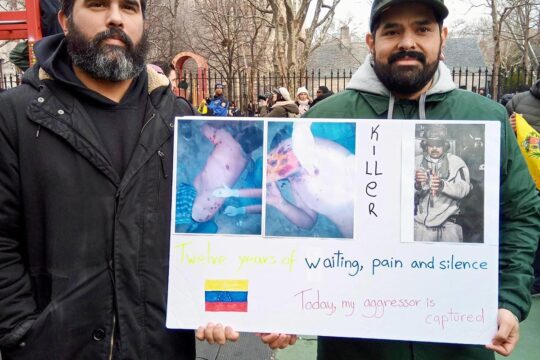Secluded in his stronghold in southern Afghanistan, reclusive Taliban Supreme Leader Hibatullah Akhundzada is the cornerstone of the movement that has ruled unchallenged since reclaiming power in 2021, strictly enforcing Islamic law.
While he has made only a handful of public appearances since inheriting the Taliban leadership in 2016, Akhundzada now faces an international arrest warrant for persecuting women and girls.
The International Criminal Court issued the warrant for Akhundzada, as well as chief justice Abdul Hakim Haqqani, on Tuesday, finding there were "reasonable grounds" to believe the pair had committed crimes against humanity in their treatment of women and girls.
After sweeping back to power in August 2021, the Taliban authorities pledged a softer rule than their first stint in power from 1996 to 2001.
But they quickly imposed restrictions that the United Nations labelled "gender apartheid".
Akhundzada himself has spearheaded measures to remove women from public life, asserting that, as a general rule, they should remain at home and be completely covered in public except for their eyes and hands.
Believed to be in his 60s or 70s, Akhundzada publishes messages on Muslim holidays and rules by decree from Kandahar, the movement's birthplace and spiritual heartland, as well as his birthplace.
He made his first official appearance as supreme leader at a religious school in Kandahar in October 2021, according to Taliban authorities, followed by several outings in recent years, mostly muzzling those who believed he was dead or in hiding in Pakistan.
The Taliban have released just one photograph of Akhundzada.
It shows him with a greying beard and white turban looking directly at the camera, and was taken more than two decades ago, according to the Taliban.
- 'Emir of the faithful' -
Before his appointment, Akhundzada was relatively unknown and not heavily involved in the insurgency's fighting operations.
A descendant of respected theologians, his own mastery of Islamic law launched him to the upper echelons of the Taliban's shadow justice system.
He holds the title of "Sheikh al-Hadith", a distinction reserved for the most eminent scholars of the Prophet Mohammed's sayings.
"Akhundzada's relative anonymity has reportedly served as a factor in the Taliban's decision to elevate him," the Counter Extremism Project (CEP), a non-profit policy organisation, said.
"Significantly less public and controversial" than other choices, he seemed like the ideal candidate to ensure discretion for the movement and "retain control over its internal factions", the CEP said.
Unlike many Taliban figures, Akhundzada is not on the United Nations sanctions list.
He quickly secured the backing of Al-Qaeda chief Ayman al-Zawahiri, who called him "the emir of the faithful", further solidifying his jihadist credentials with the Taliban's long-time allies.
Akhundzada's son Abdur Rahman carried out a suicide bombing against an Afghan military base in southern Helmand province in 2017.
After Kabul's fall in summer 2021, the "emir" gained another title, Supreme Leader of Afghanistan, which came with the challenge of transforming his movement into a governing force.
- Resistance to pressure -
In April 2022, Akhundzada called on the international community to "recognise the Islamic Emirate of Afghanistan", on the condition that its "Islamic values" and sovereignty are respected.
He has reiterated that Islamic law is the key to success and condemned foreign attempts to "interfere" in Afghan affairs.
While some diplomatic missions have remained in Kabul, the Taliban government has only recently been officially recognised by one state -- Russia -- with the rafts of restrictions imposed on Afghan women proving to be key sticking points for other nations.
In June 2023, he said Afghan women had been rescued from "oppressions" by the adoption of Islamic governance and their status as "free and dignified human beings" restored.
Analysts report growing dissent within the Taliban government ranks over some edicts, but for now, "Hibatullah has been proudly resistant to external pressure to moderate his policies", said the UN Security Council in a June 2023 report.
"There is no indication that other Kabul-based Taliban leaders can influence policy substantially," according to the document.
"The Taliban continued to prioritise unity."
However, it adds, in the long term, divisions could weaken the supreme leader's ability to maintain his iron grip on policy.


